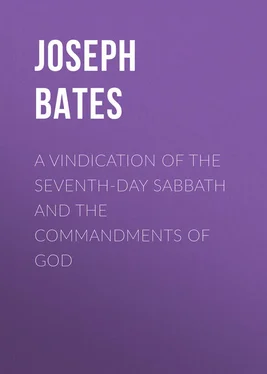Joseph Bates - A Vindication of the Seventh-Day Sabbath and the Commandments of God
Здесь есть возможность читать онлайн «Joseph Bates - A Vindication of the Seventh-Day Sabbath and the Commandments of God» — ознакомительный отрывок электронной книги совершенно бесплатно, а после прочтения отрывка купить полную версию. В некоторых случаях можно слушать аудио, скачать через торрент в формате fb2 и присутствует краткое содержание. ISBN: , Жанр: foreign_antique, foreign_prose, на английском языке. Описание произведения, (предисловие) а так же отзывы посетителей доступны на портале библиотеки ЛибКат.
- Название:A Vindication of the Seventh-Day Sabbath and the Commandments of God
- Автор:
- Жанр:
- Год:неизвестен
- ISBN:http://www.gutenberg.org/ebooks/30531
- Рейтинг книги:3 / 5. Голосов: 1
-
Избранное:Добавить в избранное
- Отзывы:
-
Ваша оценка:
- 60
- 1
- 2
- 3
- 4
- 5
A Vindication of the Seventh-Day Sabbath and the Commandments of God: краткое содержание, описание и аннотация
Предлагаем к чтению аннотацию, описание, краткое содержание или предисловие (зависит от того, что написал сам автор книги «A Vindication of the Seventh-Day Sabbath and the Commandments of God»). Если вы не нашли необходимую информацию о книге — напишите в комментариях, мы постараемся отыскать её.
A Vindication of the Seventh-Day Sabbath and the Commandments of God — читать онлайн ознакомительный отрывок
Ниже представлен текст книги, разбитый по страницам. Система сохранения места последней прочитанной страницы, позволяет с удобством читать онлайн бесплатно книгу «A Vindication of the Seventh-Day Sabbath and the Commandments of God», без необходимости каждый раз заново искать на чём Вы остановились. Поставьте закладку, и сможете в любой момент перейти на страницу, на которой закончили чтение.
Интервал:
Закладка:
It is that since the winter of 1845, you have, by your deceptive arts, and false expositions of God's Word, taught and practiced ridiculous things in the churches, such as God never has, nor ever will approve. Your confession last spring in the Boston Conference seemed more like justifying and exalting yourself from your debased and fallen condition, than a bible confession, which says, “confess your faults one to another.” But you perceived, I suppose with others, that it had become fashionable to confess the monstrous errors in our past experience in the advent doctrine to those who had drawn back and organized under the Laodocean state of the church. And also, that J. Marsh of Rochester, and others from different places, were distinguishing themselves by their wonderful confessions; therefore you also confessed how sorry you were for the mischief (or injury) that you had done the cause of God by writing and preaching the doctrine of shut door and Bridegroom come . Here you attempted to put down and destroy two of the most important and prominent truths according to the types and new testament teaching, with our history in the past, that is connected with the “twenty-three hundred days,” and “cleansing of, or vindicating the sanctuary”; and use them as a scape goat to carry off and hide your unholy and iniquitous practices from their view. Why not confess that after you and A. Hale had published this clear scriptural view, that you had been so positive that you were right in your position, that at one of your meeting places in Portsmouth, N. H., you declared that you was ready to seal it with your own heart's blood, and that the appointment which you afterwards made to meet at Richard Walker's, if not, you would state the reason by writing, had been utterly disregarded, although you had passed through there several times. Why not confess with contrition your unscriptural teachings and practices? And lastly, why not inform your listening audience of the wonderful discovery and proficiency which you had made during that time, in the growing science of your predecessors, “Jannes and Jambres?” and what a loving drawing and wonderful effect this mesmeric influence produced on some of the dear sisters! You was aware that such kind of satanic practices would not go down with your hearers, therefore you withheld it probably for a more convenient season. The response from heaven to this confession (I think) is long since recorded by a servant of the Lord. Isa. i: 10-15. Since you began to preach in New Bedford, where it was said such a wonderful revival was following your preaching and practice, that some in Fairhaven were looked upon as sinners, because they would not believe that you were filled with the Holy Ghost. Here in New Bedford, I am told, that in reply to some of these charges: that you had studied or looked into the subject of mesmerism that you might ascertain the cause, or meaning, of the delusions practiced by the advent people. I think that by comparing dates, it may pretty clearly be known that this is one of the first and principal causes of the state of things now among many in Maine, especially where your influence was felt. In the course of this conversation you stated something else, which you will remember, and for fear, or something else, that it would not be believed, you said you could prove it by certain persons whom you named. I have since ascertained that these persons neither know , nor have ever known , or have intimated any such thing . Now, I ask, how much your confessions are worth in Boston or any where else. In the name of my Master, I here warn the little flock to beware of your ungodly teaching.
Since answering your argument on the first day for the seventh, I see by the Advocate of Dec. 16th, your exulting reply to J. B. Cook. Because he has not met every point of your twisted, sophistical argument, you now think it will stand forever. You say “The position I have taken will stand the onset of all while the eternal rock of inspiration stands secure; hence with confidence calm as heaven, I take my pen to reply,” &c. We read that “the Devils believe and tremble,” while this wonderful man is calm as heaven , because he thinks he has gained one day since the crucifixion, which would destroy the law of God, the fourth commandment, when in fact he has only stole six or eight hours. Perhaps he will try to borrow or take the balance in the forthcoming articles which he promises. And here he says again, “ the matter shall rest without a review on either side”!! “Vanity of vanities, saith the preacher!” Will God's word forever remain unvindicated, because of your veto? Your one mistake that I have shown, proves your infallibility. Let me repeat it in connection: In your text, Matt. xii: 39, 40, it states three days and three nights. This itself overthrows the whole of your argument – for three days are just as long as three nights. See how it will work by your rule: Jesus entombed just about 6 P.M. on Friday. Now count – Friday evening, one night; Saturday evening, two nights; Sunday evening, three nights. Now for the days: Saturday, one; Sunday, two; and Monday three. But to make it three, the resurrection must be on Monday evening, at 6 o'clock, and the scripture says he arose in the morning! Then if you wait until Tuesday morning, you make it just three and a half days and four nights, and your Sabbath commences on Monday. But if you say it must be Monday morning, then you have but two days and twelve hours. You say this would be the third day, just as I say – true, but this text says “three days.” Besides, you say in your second article, “some have been so vain on this point as to count the day of the crucifixion, one; the next day, one; and then the morning while it was yet dark, one; and therefore the third day. This is almost wicked. Does not Jesus Christ in whose word we trust – say three nights ?” Yes, sir, and does he not as expressly say three days , too? If we are almost wicked in counting, as you say, then all the evangelists were, Mark and Luke especially. I say there is no other rule but the one you call us vain for using. If it is almost wicked to count a part of the first day, for one day, by what authority do you count a part of the last day, for one day? The scripture no where says, two days, and three nights.
And then as I have shown where you borrowed a part of a night, by counting Friday night for one of your three nights, when you insisted upon it that it was past, because the disciples had no time left of Friday to even prepare their spices. Did you not see that if you claimed six hours of Friday, to break the scriptures, that the disciples would have just as much time to prepare for the Sabbath? How is it that you do not understand what the angel Gabriel said should be in the last days: “But the wicked shall do wickedly, and none of the wicked shall understand.” I really hope no one will be troubled with your forthcoming article. It would be far easier for you to shovel the Alleghany mountains into Lake Ontario than to attempt to gain one day, or prove that we have lost one.
Your threat about the fallacy of history, and what you will do about it, is also vain; yet, if you could do so, the bible is a sufficient rule in this case. You have therefore made but two and a half days and two nights, and work it which way you will, you will fail. You cannot destroy the validity of the other eighteen texts.
It is clear that the Jewish feasts always occurred when they fell on the Sabbath of the Lord. Lev. xxiii: 37, last cl.
Barnabas Against The Sabbath
Barnabas would fain have the world believe that God has made one law which man could never keep without leading him into bondage. He says, “Sister Stowe, nor any others of like faith pretends to keep the seventh-day according to the commandment, that reads, ‘thou shalt not do any work.’ Exo. xx: 10. ‘Let no man go out of his place on the seventh day.’ There stands the command with all its terrible sanctions of thunder and lightnings. If this command is now in force sister S. and all the rest must stand condemned at the dread tribunal of God, for they all break that commandment as much as we who do not pretend to keep it.” The speciousness of B.'s reasoning is a great deal more likely to lead saints into bondage, than what he has said of sister Stowe. He begins in the very onset to mislead the mind. He quotes “Let no man go out of his place on the seventh day,” and says, there stands the command with all its terrible sanctions of thunder and lightnings, and then says sister S. and Br. Bates and all the rest must stand condemned at the dread tribunal of God, for they all break that commandment . Now I say this is not a commandment, but a command given to the children of Israel twenty days before they heard that terrible thunder and lightning at mount Sinai, where the ten commandments was made known to them by the Almighty God's speaking them all out in an audible voice, and then writing them with his own finger on tables of stone. These are all the commandments that God ever gave to man, and they were as equally binding on the stranger, (the Gentile) that was within their gates, as on the Jew. Every one can see how difficult it would be for a man well versed in scripture to remember every direction, or a “thus sayeth the Lord,” for a commandment, especially the millions who cannot read. They were of that character, of so few words, that God directed them to “bind them for a sign upon their hands, and they shall be as a frontlet between thine eyes,” (“that the Lord's law may be in thy mouth .” Exo. xiii: 9,) “and thou shalt write them upon the posts of thy house, and on thy gates.” Num. xv: 38-40; Deut. vi: 8, 9. This, God's code of Laws was put into the Ark. Deut. x: 5. And he says that “one law shall be to him that is home born and to the stranger that sojourneth with you.” Exo. xii: 49. Now Moses' code of laws was written in a book and placed in the same ark. Deut. xxxi: 24-26. This law from the xiv. ch. and onwards, and in Lev. was to be read to the whole assembly once in seven years; see xxxi: 10-12, and Neh. viii: 1-6. Six hours, reading from morning to noon. But the ten commandments as in Exo. xx: 1-17, can be read in three minutes. If you want to understand God's code of laws separately set forth and enforced, see from iv. to xiv. of Deut. His reasons for giving them to the Jews, vii: 6-8, and x: 22. He tells them they shall not add nor diminish from them. Deut. iv: 2. (Mind this.) “The man for gathering sticks (either to kindle a fire for his comfort, or cook some food, B. says,) was by the command stoned to death.” This is all supposition; nobody knows what he gathered sticks for, or what size they were; he was stoned to death for it, and so we might be now if the law of Moses was in force. Let it be distinctly understood, that God's code of laws, which comprises the ten commandments, does not forbid us to kindle fires on his Sabbath; nor require us to stay in our houses, nor forbid us to assemble together to worship; neither does it forbid us to administer to the sick on his Sabbath, nor do any work of absolute necessity. These I propose to treat upon more at large, under the head Scriptural Observance of the Sabbath .
Читать дальшеИнтервал:
Закладка:
Похожие книги на «A Vindication of the Seventh-Day Sabbath and the Commandments of God»
Представляем Вашему вниманию похожие книги на «A Vindication of the Seventh-Day Sabbath and the Commandments of God» списком для выбора. Мы отобрали схожую по названию и смыслу литературу в надежде предоставить читателям больше вариантов отыскать новые, интересные, ещё непрочитанные произведения.
Обсуждение, отзывы о книге «A Vindication of the Seventh-Day Sabbath and the Commandments of God» и просто собственные мнения читателей. Оставьте ваши комментарии, напишите, что Вы думаете о произведении, его смысле или главных героях. Укажите что конкретно понравилось, а что нет, и почему Вы так считаете.












